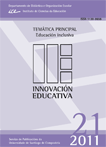Barriers that prevent inclusive schools and some atrategies to build a school without exclusions
Main Article Content
Abstract
Secondly, I discribe which have been the barriers that the speech movement and integration practices have originated so that these groups were not respected for their individualities nor could they participate in full right and responsibility to build an educational and social culture.
Finally, in third place, I propose a series of pedagogical strategies which are essential to build a school as well as a society without exclusions, in which human rights are met.


